Examining Staff Conduct: Bandura's Social Cognitive Theory and Factors
VerifiedAdded on 2023/01/12
|8
|1899
|39
Report
AI Summary
This report delves into Albert Bandura's Social Cognitive Theory to examine the factors influencing staff conduct, particularly within the context of the Liverpool Care Trust. It highlights the importance of environmental aspects, such as technological changes and the need for training, to adapt to new systems and improve staff learning experiences. The report also emphasizes the significance of behavioral aspects, including employee engagement, rewards, and understanding human behavior to address workload issues and improve employee satisfaction. By analyzing these factors, the report underscores how organizations can use Bandura's theory to enhance staff motivation, promote adaptability, and ultimately improve service delivery. The study emphasizes the need for supportive environments, appropriate resources, and a focus on employee needs to facilitate successful implementation of changes and achieve organizational goals.
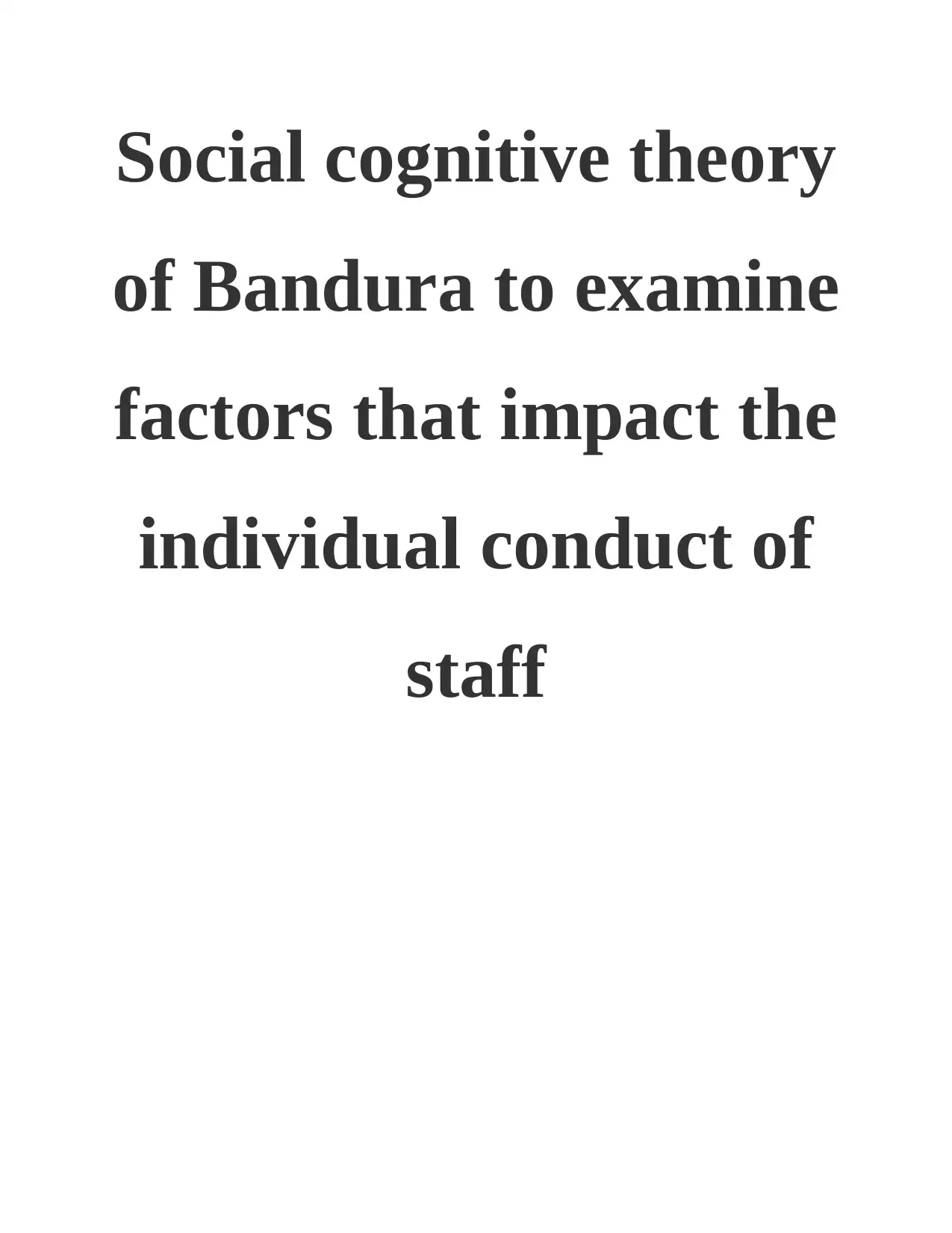
Social cognitive theory
of Bandura to examine
factors that impact the
individual conduct of
staff
of Bandura to examine
factors that impact the
individual conduct of
staff
Paraphrase This Document
Need a fresh take? Get an instant paraphrase of this document with our AI Paraphraser
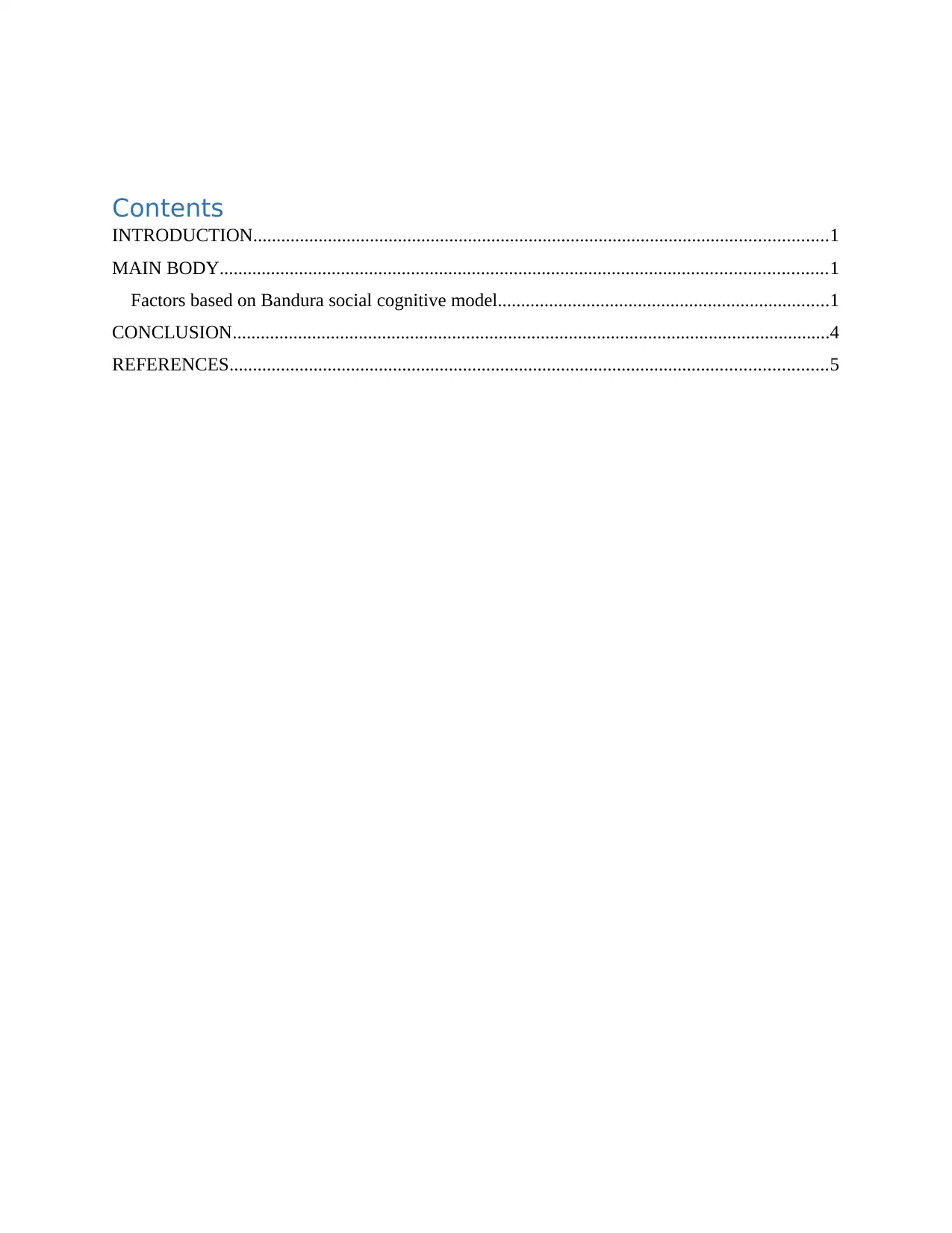
Contents
INTRODUCTION...........................................................................................................................1
MAIN BODY..................................................................................................................................1
Factors based on Bandura social cognitive model.......................................................................1
CONCLUSION................................................................................................................................4
REFERENCES................................................................................................................................5
INTRODUCTION...........................................................................................................................1
MAIN BODY..................................................................................................................................1
Factors based on Bandura social cognitive model.......................................................................1
CONCLUSION................................................................................................................................4
REFERENCES................................................................................................................................5
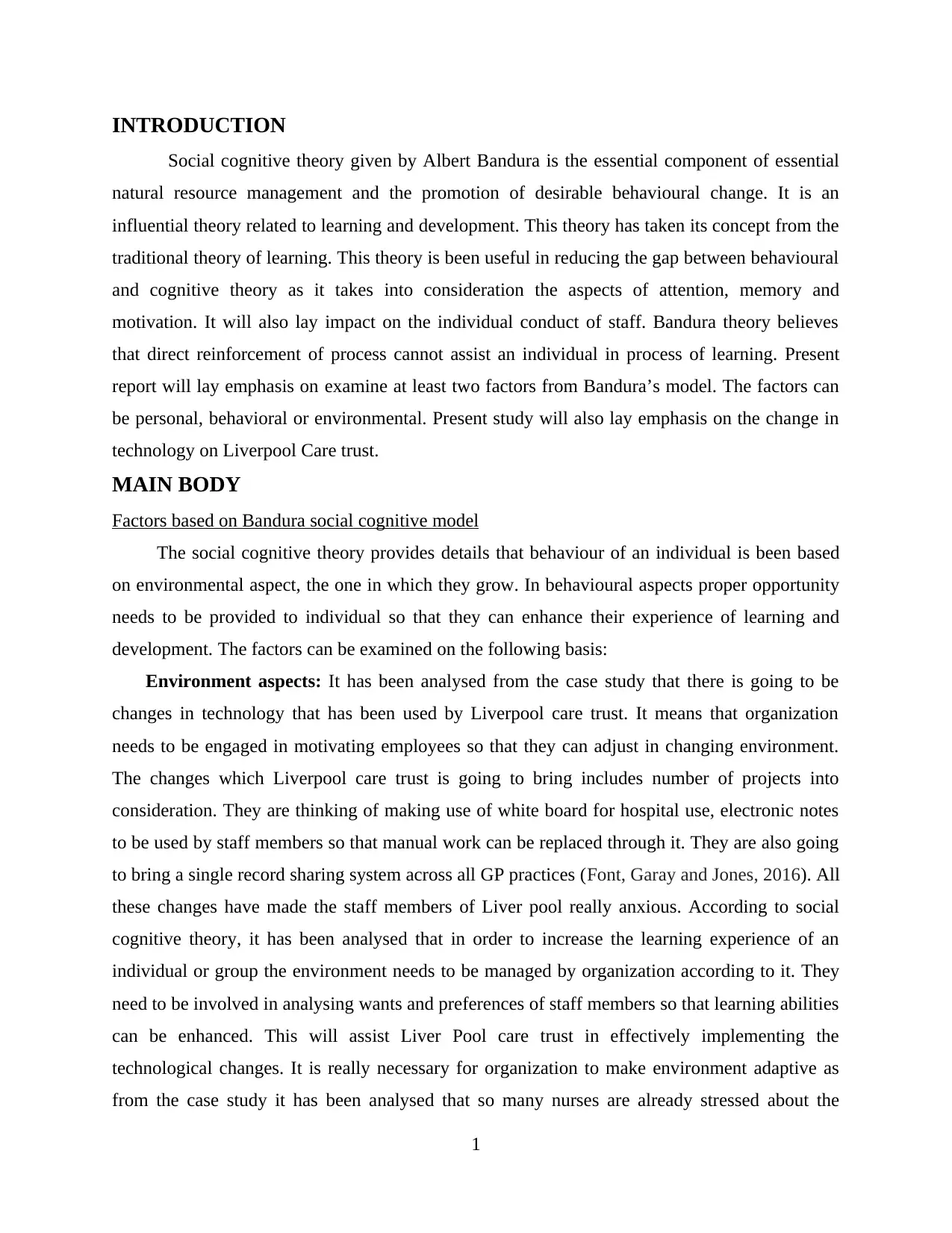
INTRODUCTION
Social cognitive theory given by Albert Bandura is the essential component of essential
natural resource management and the promotion of desirable behavioural change. It is an
influential theory related to learning and development. This theory has taken its concept from the
traditional theory of learning. This theory is been useful in reducing the gap between behavioural
and cognitive theory as it takes into consideration the aspects of attention, memory and
motivation. It will also lay impact on the individual conduct of staff. Bandura theory believes
that direct reinforcement of process cannot assist an individual in process of learning. Present
report will lay emphasis on examine at least two factors from Bandura’s model. The factors can
be personal, behavioral or environmental. Present study will also lay emphasis on the change in
technology on Liverpool Care trust.
MAIN BODY
Factors based on Bandura social cognitive model
The social cognitive theory provides details that behaviour of an individual is been based
on environmental aspect, the one in which they grow. In behavioural aspects proper opportunity
needs to be provided to individual so that they can enhance their experience of learning and
development. The factors can be examined on the following basis:
Environment aspects: It has been analysed from the case study that there is going to be
changes in technology that has been used by Liverpool care trust. It means that organization
needs to be engaged in motivating employees so that they can adjust in changing environment.
The changes which Liverpool care trust is going to bring includes number of projects into
consideration. They are thinking of making use of white board for hospital use, electronic notes
to be used by staff members so that manual work can be replaced through it. They are also going
to bring a single record sharing system across all GP practices (Font, Garay and Jones, 2016). All
these changes have made the staff members of Liver pool really anxious. According to social
cognitive theory, it has been analysed that in order to increase the learning experience of an
individual or group the environment needs to be managed by organization according to it. They
need to be involved in analysing wants and preferences of staff members so that learning abilities
can be enhanced. This will assist Liver Pool care trust in effectively implementing the
technological changes. It is really necessary for organization to make environment adaptive as
from the case study it has been analysed that so many nurses are already stressed about the
1
Social cognitive theory given by Albert Bandura is the essential component of essential
natural resource management and the promotion of desirable behavioural change. It is an
influential theory related to learning and development. This theory has taken its concept from the
traditional theory of learning. This theory is been useful in reducing the gap between behavioural
and cognitive theory as it takes into consideration the aspects of attention, memory and
motivation. It will also lay impact on the individual conduct of staff. Bandura theory believes
that direct reinforcement of process cannot assist an individual in process of learning. Present
report will lay emphasis on examine at least two factors from Bandura’s model. The factors can
be personal, behavioral or environmental. Present study will also lay emphasis on the change in
technology on Liverpool Care trust.
MAIN BODY
Factors based on Bandura social cognitive model
The social cognitive theory provides details that behaviour of an individual is been based
on environmental aspect, the one in which they grow. In behavioural aspects proper opportunity
needs to be provided to individual so that they can enhance their experience of learning and
development. The factors can be examined on the following basis:
Environment aspects: It has been analysed from the case study that there is going to be
changes in technology that has been used by Liverpool care trust. It means that organization
needs to be engaged in motivating employees so that they can adjust in changing environment.
The changes which Liverpool care trust is going to bring includes number of projects into
consideration. They are thinking of making use of white board for hospital use, electronic notes
to be used by staff members so that manual work can be replaced through it. They are also going
to bring a single record sharing system across all GP practices (Font, Garay and Jones, 2016). All
these changes have made the staff members of Liver pool really anxious. According to social
cognitive theory, it has been analysed that in order to increase the learning experience of an
individual or group the environment needs to be managed by organization according to it. They
need to be involved in analysing wants and preferences of staff members so that learning abilities
can be enhanced. This will assist Liver Pool care trust in effectively implementing the
technological changes. It is really necessary for organization to make environment adaptive as
from the case study it has been analysed that so many nurses are already stressed about the
1
⊘ This is a preview!⊘
Do you want full access?
Subscribe today to unlock all pages.

Trusted by 1+ million students worldwide
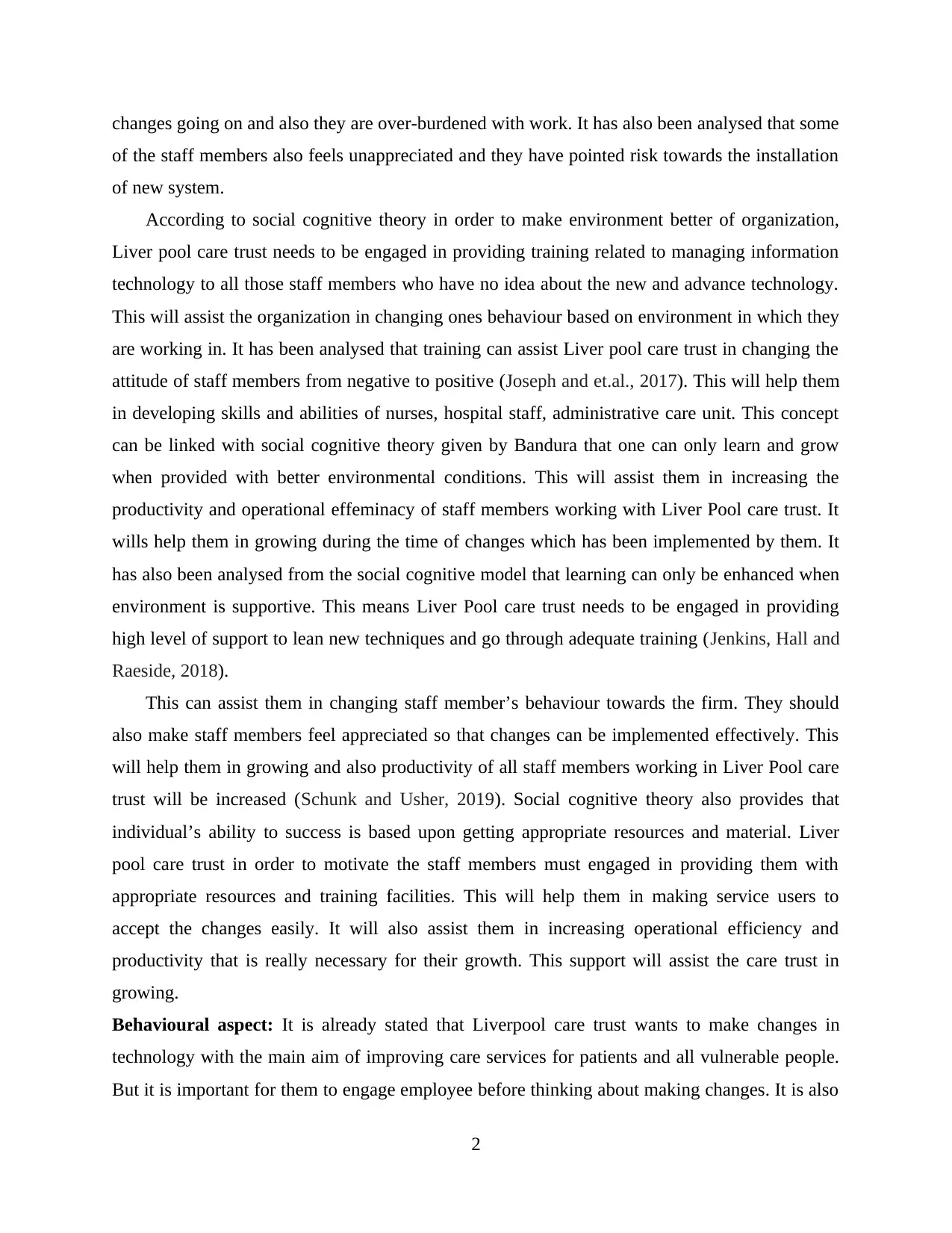
changes going on and also they are over-burdened with work. It has also been analysed that some
of the staff members also feels unappreciated and they have pointed risk towards the installation
of new system.
According to social cognitive theory in order to make environment better of organization,
Liver pool care trust needs to be engaged in providing training related to managing information
technology to all those staff members who have no idea about the new and advance technology.
This will assist the organization in changing ones behaviour based on environment in which they
are working in. It has been analysed that training can assist Liver pool care trust in changing the
attitude of staff members from negative to positive (Joseph and et.al., 2017). This will help them
in developing skills and abilities of nurses, hospital staff, administrative care unit. This concept
can be linked with social cognitive theory given by Bandura that one can only learn and grow
when provided with better environmental conditions. This will assist them in increasing the
productivity and operational effeminacy of staff members working with Liver Pool care trust. It
wills help them in growing during the time of changes which has been implemented by them. It
has also been analysed from the social cognitive model that learning can only be enhanced when
environment is supportive. This means Liver Pool care trust needs to be engaged in providing
high level of support to lean new techniques and go through adequate training (Jenkins, Hall and
Raeside, 2018).
This can assist them in changing staff member’s behaviour towards the firm. They should
also make staff members feel appreciated so that changes can be implemented effectively. This
will help them in growing and also productivity of all staff members working in Liver Pool care
trust will be increased (Schunk and Usher, 2019). Social cognitive theory also provides that
individual’s ability to success is based upon getting appropriate resources and material. Liver
pool care trust in order to motivate the staff members must engaged in providing them with
appropriate resources and training facilities. This will help them in making service users to
accept the changes easily. It will also assist them in increasing operational efficiency and
productivity that is really necessary for their growth. This support will assist the care trust in
growing.
Behavioural aspect: It is already stated that Liverpool care trust wants to make changes in
technology with the main aim of improving care services for patients and all vulnerable people.
But it is important for them to engage employee before thinking about making changes. It is also
2
of the staff members also feels unappreciated and they have pointed risk towards the installation
of new system.
According to social cognitive theory in order to make environment better of organization,
Liver pool care trust needs to be engaged in providing training related to managing information
technology to all those staff members who have no idea about the new and advance technology.
This will assist the organization in changing ones behaviour based on environment in which they
are working in. It has been analysed that training can assist Liver pool care trust in changing the
attitude of staff members from negative to positive (Joseph and et.al., 2017). This will help them
in developing skills and abilities of nurses, hospital staff, administrative care unit. This concept
can be linked with social cognitive theory given by Bandura that one can only learn and grow
when provided with better environmental conditions. This will assist them in increasing the
productivity and operational effeminacy of staff members working with Liver Pool care trust. It
wills help them in growing during the time of changes which has been implemented by them. It
has also been analysed from the social cognitive model that learning can only be enhanced when
environment is supportive. This means Liver Pool care trust needs to be engaged in providing
high level of support to lean new techniques and go through adequate training (Jenkins, Hall and
Raeside, 2018).
This can assist them in changing staff member’s behaviour towards the firm. They should
also make staff members feel appreciated so that changes can be implemented effectively. This
will help them in growing and also productivity of all staff members working in Liver Pool care
trust will be increased (Schunk and Usher, 2019). Social cognitive theory also provides that
individual’s ability to success is based upon getting appropriate resources and material. Liver
pool care trust in order to motivate the staff members must engaged in providing them with
appropriate resources and training facilities. This will help them in making service users to
accept the changes easily. It will also assist them in increasing operational efficiency and
productivity that is really necessary for their growth. This support will assist the care trust in
growing.
Behavioural aspect: It is already stated that Liverpool care trust wants to make changes in
technology with the main aim of improving care services for patients and all vulnerable people.
But it is important for them to engage employee before thinking about making changes. It is also
2
Paraphrase This Document
Need a fresh take? Get an instant paraphrase of this document with our AI Paraphraser
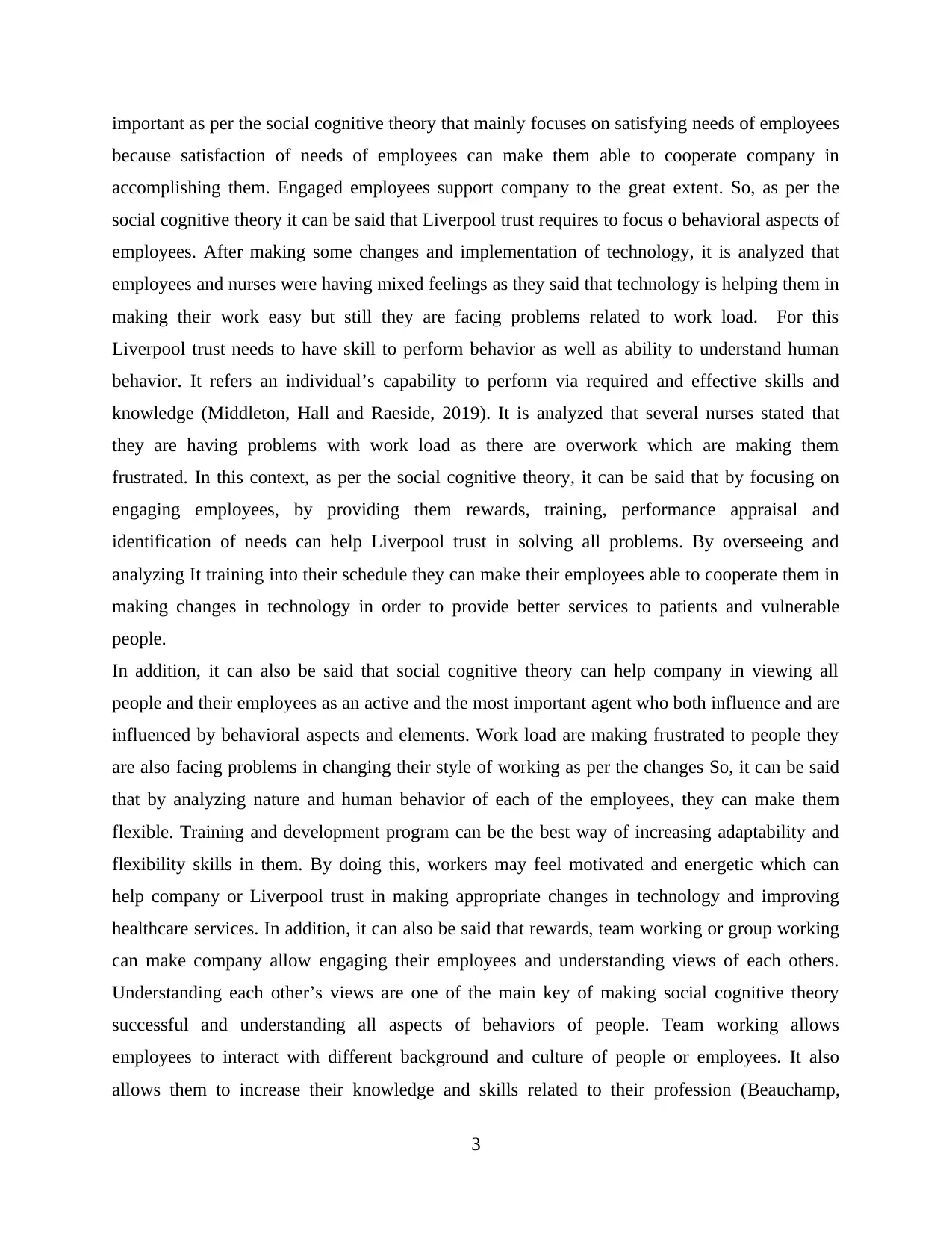
important as per the social cognitive theory that mainly focuses on satisfying needs of employees
because satisfaction of needs of employees can make them able to cooperate company in
accomplishing them. Engaged employees support company to the great extent. So, as per the
social cognitive theory it can be said that Liverpool trust requires to focus o behavioral aspects of
employees. After making some changes and implementation of technology, it is analyzed that
employees and nurses were having mixed feelings as they said that technology is helping them in
making their work easy but still they are facing problems related to work load. For this
Liverpool trust needs to have skill to perform behavior as well as ability to understand human
behavior. It refers an individual’s capability to perform via required and effective skills and
knowledge (Middleton, Hall and Raeside, 2019). It is analyzed that several nurses stated that
they are having problems with work load as there are overwork which are making them
frustrated. In this context, as per the social cognitive theory, it can be said that by focusing on
engaging employees, by providing them rewards, training, performance appraisal and
identification of needs can help Liverpool trust in solving all problems. By overseeing and
analyzing It training into their schedule they can make their employees able to cooperate them in
making changes in technology in order to provide better services to patients and vulnerable
people.
In addition, it can also be said that social cognitive theory can help company in viewing all
people and their employees as an active and the most important agent who both influence and are
influenced by behavioral aspects and elements. Work load are making frustrated to people they
are also facing problems in changing their style of working as per the changes So, it can be said
that by analyzing nature and human behavior of each of the employees, they can make them
flexible. Training and development program can be the best way of increasing adaptability and
flexibility skills in them. By doing this, workers may feel motivated and energetic which can
help company or Liverpool trust in making appropriate changes in technology and improving
healthcare services. In addition, it can also be said that rewards, team working or group working
can make company allow engaging their employees and understanding views of each others.
Understanding each other’s views are one of the main key of making social cognitive theory
successful and understanding all aspects of behaviors of people. Team working allows
employees to interact with different background and culture of people or employees. It also
allows them to increase their knowledge and skills related to their profession (Beauchamp,
3
because satisfaction of needs of employees can make them able to cooperate company in
accomplishing them. Engaged employees support company to the great extent. So, as per the
social cognitive theory it can be said that Liverpool trust requires to focus o behavioral aspects of
employees. After making some changes and implementation of technology, it is analyzed that
employees and nurses were having mixed feelings as they said that technology is helping them in
making their work easy but still they are facing problems related to work load. For this
Liverpool trust needs to have skill to perform behavior as well as ability to understand human
behavior. It refers an individual’s capability to perform via required and effective skills and
knowledge (Middleton, Hall and Raeside, 2019). It is analyzed that several nurses stated that
they are having problems with work load as there are overwork which are making them
frustrated. In this context, as per the social cognitive theory, it can be said that by focusing on
engaging employees, by providing them rewards, training, performance appraisal and
identification of needs can help Liverpool trust in solving all problems. By overseeing and
analyzing It training into their schedule they can make their employees able to cooperate them in
making changes in technology in order to provide better services to patients and vulnerable
people.
In addition, it can also be said that social cognitive theory can help company in viewing all
people and their employees as an active and the most important agent who both influence and are
influenced by behavioral aspects and elements. Work load are making frustrated to people they
are also facing problems in changing their style of working as per the changes So, it can be said
that by analyzing nature and human behavior of each of the employees, they can make them
flexible. Training and development program can be the best way of increasing adaptability and
flexibility skills in them. By doing this, workers may feel motivated and energetic which can
help company or Liverpool trust in making appropriate changes in technology and improving
healthcare services. In addition, it can also be said that rewards, team working or group working
can make company allow engaging their employees and understanding views of each others.
Understanding each other’s views are one of the main key of making social cognitive theory
successful and understanding all aspects of behaviors of people. Team working allows
employees to interact with different background and culture of people or employees. It also
allows them to increase their knowledge and skills related to their profession (Beauchamp,
3
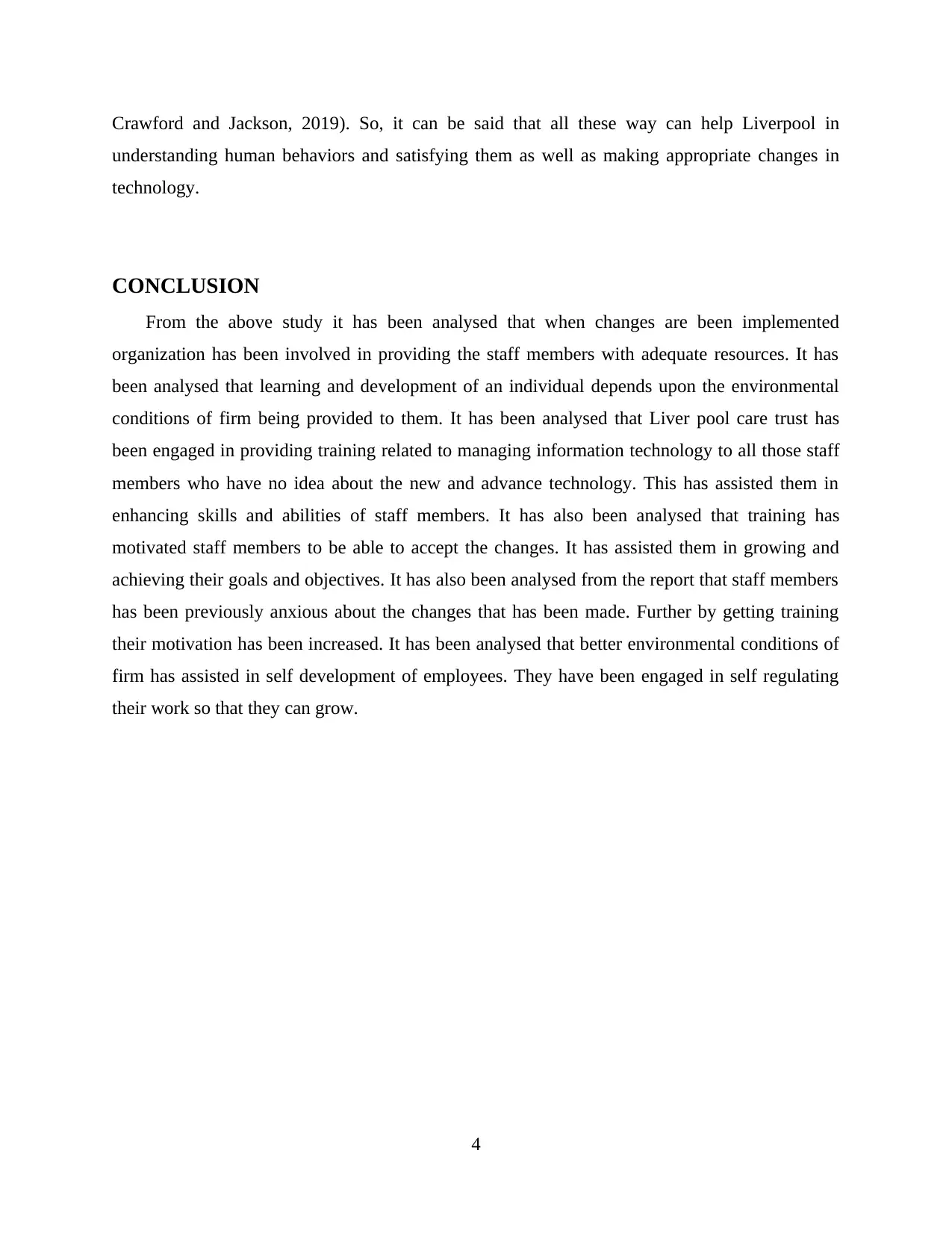
Crawford and Jackson, 2019). So, it can be said that all these way can help Liverpool in
understanding human behaviors and satisfying them as well as making appropriate changes in
technology.
CONCLUSION
From the above study it has been analysed that when changes are been implemented
organization has been involved in providing the staff members with adequate resources. It has
been analysed that learning and development of an individual depends upon the environmental
conditions of firm being provided to them. It has been analysed that Liver pool care trust has
been engaged in providing training related to managing information technology to all those staff
members who have no idea about the new and advance technology. This has assisted them in
enhancing skills and abilities of staff members. It has also been analysed that training has
motivated staff members to be able to accept the changes. It has assisted them in growing and
achieving their goals and objectives. It has also been analysed from the report that staff members
has been previously anxious about the changes that has been made. Further by getting training
their motivation has been increased. It has been analysed that better environmental conditions of
firm has assisted in self development of employees. They have been engaged in self regulating
their work so that they can grow.
4
understanding human behaviors and satisfying them as well as making appropriate changes in
technology.
CONCLUSION
From the above study it has been analysed that when changes are been implemented
organization has been involved in providing the staff members with adequate resources. It has
been analysed that learning and development of an individual depends upon the environmental
conditions of firm being provided to them. It has been analysed that Liver pool care trust has
been engaged in providing training related to managing information technology to all those staff
members who have no idea about the new and advance technology. This has assisted them in
enhancing skills and abilities of staff members. It has also been analysed that training has
motivated staff members to be able to accept the changes. It has assisted them in growing and
achieving their goals and objectives. It has also been analysed from the report that staff members
has been previously anxious about the changes that has been made. Further by getting training
their motivation has been increased. It has been analysed that better environmental conditions of
firm has assisted in self development of employees. They have been engaged in self regulating
their work so that they can grow.
4
⊘ This is a preview!⊘
Do you want full access?
Subscribe today to unlock all pages.

Trusted by 1+ million students worldwide
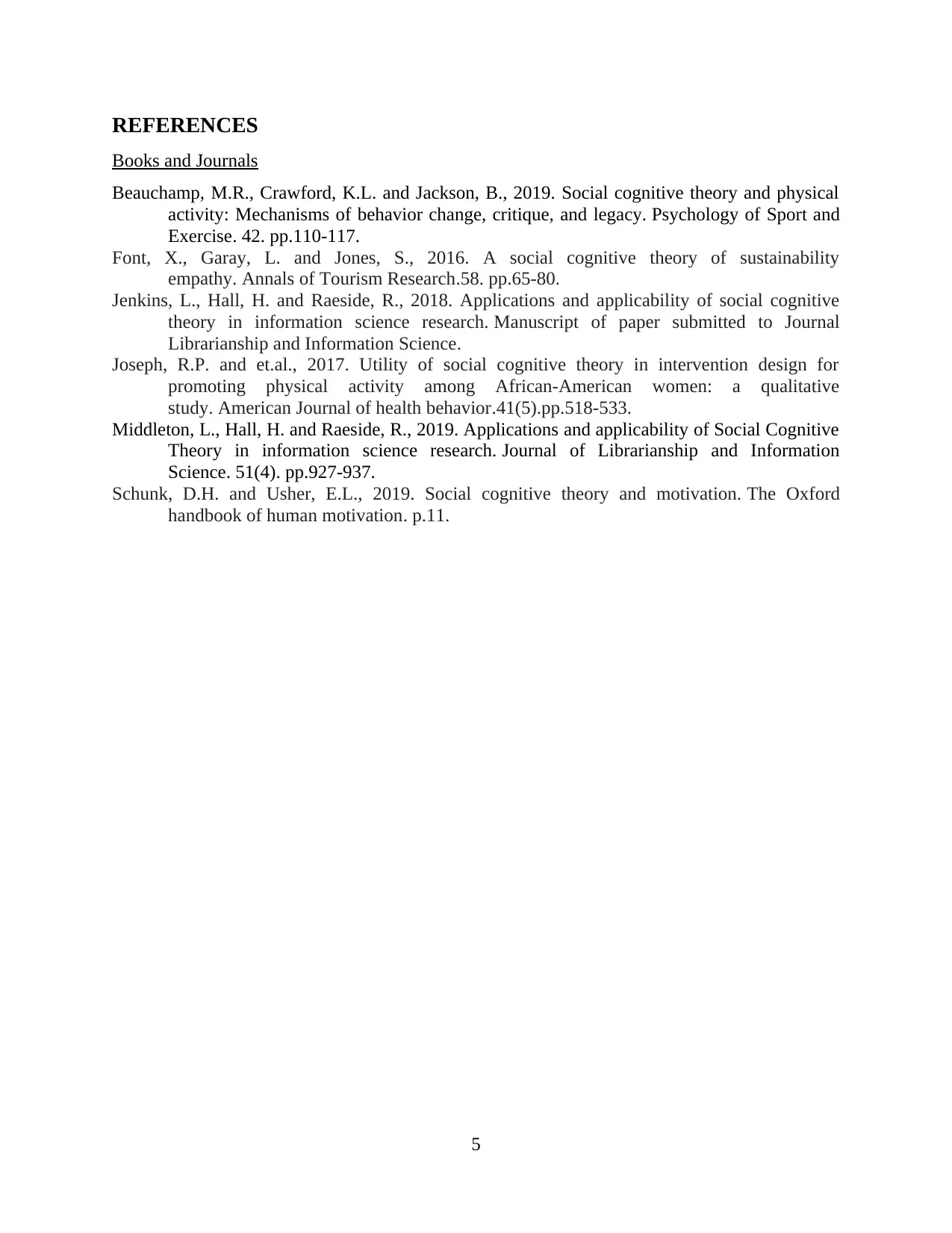
REFERENCES
Books and Journals
Beauchamp, M.R., Crawford, K.L. and Jackson, B., 2019. Social cognitive theory and physical
activity: Mechanisms of behavior change, critique, and legacy. Psychology of Sport and
Exercise. 42. pp.110-117.
Font, X., Garay, L. and Jones, S., 2016. A social cognitive theory of sustainability
empathy. Annals of Tourism Research.58. pp.65-80.
Jenkins, L., Hall, H. and Raeside, R., 2018. Applications and applicability of social cognitive
theory in information science research. Manuscript of paper submitted to Journal
Librarianship and Information Science.
Joseph, R.P. and et.al., 2017. Utility of social cognitive theory in intervention design for
promoting physical activity among African-American women: a qualitative
study. American Journal of health behavior.41(5).pp.518-533.
Middleton, L., Hall, H. and Raeside, R., 2019. Applications and applicability of Social Cognitive
Theory in information science research. Journal of Librarianship and Information
Science. 51(4). pp.927-937.
Schunk, D.H. and Usher, E.L., 2019. Social cognitive theory and motivation. The Oxford
handbook of human motivation. p.11.
5
Books and Journals
Beauchamp, M.R., Crawford, K.L. and Jackson, B., 2019. Social cognitive theory and physical
activity: Mechanisms of behavior change, critique, and legacy. Psychology of Sport and
Exercise. 42. pp.110-117.
Font, X., Garay, L. and Jones, S., 2016. A social cognitive theory of sustainability
empathy. Annals of Tourism Research.58. pp.65-80.
Jenkins, L., Hall, H. and Raeside, R., 2018. Applications and applicability of social cognitive
theory in information science research. Manuscript of paper submitted to Journal
Librarianship and Information Science.
Joseph, R.P. and et.al., 2017. Utility of social cognitive theory in intervention design for
promoting physical activity among African-American women: a qualitative
study. American Journal of health behavior.41(5).pp.518-533.
Middleton, L., Hall, H. and Raeside, R., 2019. Applications and applicability of Social Cognitive
Theory in information science research. Journal of Librarianship and Information
Science. 51(4). pp.927-937.
Schunk, D.H. and Usher, E.L., 2019. Social cognitive theory and motivation. The Oxford
handbook of human motivation. p.11.
5
Paraphrase This Document
Need a fresh take? Get an instant paraphrase of this document with our AI Paraphraser

6
1 out of 8
Related Documents
Your All-in-One AI-Powered Toolkit for Academic Success.
+13062052269
info@desklib.com
Available 24*7 on WhatsApp / Email
![[object Object]](/_next/static/media/star-bottom.7253800d.svg)
Unlock your academic potential
Copyright © 2020–2026 A2Z Services. All Rights Reserved. Developed and managed by ZUCOL.





